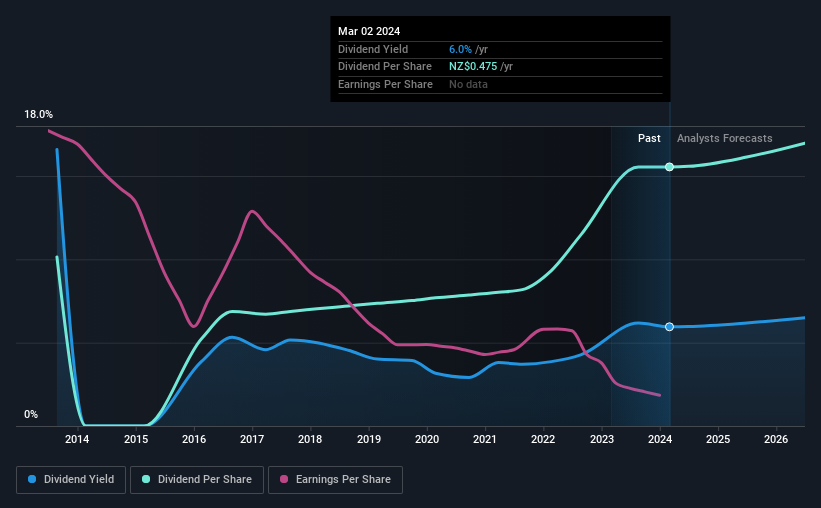Chorus' (NZSE:CNU) Dividend Will Be NZ$0.19
Chorus Limited (NZSE:CNU) will pay a dividend of NZ$0.19 on the 16th of April. This will take the annual payment to 6.0% of the stock price, which is above what most companies in the industry pay.
View our latest analysis for Chorus
Chorus Is Paying Out More Than It Is Earning
If the payments aren't sustainable, a high yield for a few years won't matter that much. Before making this announcement, the company's dividend was much higher than its earnings. It will be difficult to sustain this level of payout so we wouldn't be confident about this continuing.
Earnings per share is forecast to rise exponentially over the next year. If the dividend continues along recent trends, we estimate the payout ratio could reach 302%, which is unsustainable.
Dividend Volatility
Although the company has a long dividend history, it has been cut at least once in the last 10 years. The dividend has gone from an annual total of NZ$0.31 in 2014 to the most recent total annual payment of NZ$0.475. This means that it has been growing its distributions at 4.4% per annum over that time. We're glad to see the dividend has risen, but with a limited rate of growth and fluctuations in the payments the total shareholder return may be limited.
The Dividend Has Limited Growth Potential
Growing earnings per share could be a mitigating factor when considering the past fluctuations in the dividend. Chorus' EPS has fallen by approximately 21% per year during the past five years. A sharp decline in earnings per share is not great from from a dividend perspective. Even conservative payout ratios can come under pressure if earnings fall far enough. However, the next year is actually looking up, with earnings set to rise. We would just wait until it becomes a pattern before getting too excited.
We're Not Big Fans Of Chorus' Dividend
In summary, investors will like to be receiving a higher dividend, but we have some questions about whether it can be sustained over the long term. The company's earnings aren't high enough to be making such big distributions, and it isn't backed up by strong growth or consistency either. Considering all of these factors, we wouldn't rely on this dividend if we wanted to live on the income.
Market movements attest to how highly valued a consistent dividend policy is compared to one which is more unpredictable. Still, investors need to consider a host of other factors, apart from dividend payments, when analysing a company. For example, we've identified 4 warning signs for Chorus (2 are concerning!) that you should be aware of before investing. Looking for more high-yielding dividend ideas? Try our collection of strong dividend payers.
Have feedback on this article? Concerned about the content? Get in touch with us directly. Alternatively, email editorial-team (at) simplywallst.com.
This article by Simply Wall St is general in nature. We provide commentary based on historical data and analyst forecasts only using an unbiased methodology and our articles are not intended to be financial advice. It does not constitute a recommendation to buy or sell any stock, and does not take account of your objectives, or your financial situation. We aim to bring you long-term focused analysis driven by fundamental data. Note that our analysis may not factor in the latest price-sensitive company announcements or qualitative material. Simply Wall St has no position in any stocks mentioned.

 Yahoo Finance
Yahoo Finance 
